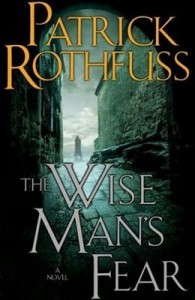The Wise Man’s Fear, by Patrick Rothfuss
Synopsis: The second book in the Kingkiller Trilogy. Kvothe continues his education at the University while searching for information about his family’s killers (the Chandrian) and trying to woo his first love (Denna). Along the way he learns magic, is taught the martial arts of the far east, spends time in the faire realm, and gets wrapped up in political intrigue. It sounds cliché when summarized like this, but it is extremely well done.
Brief Book Review: This book is amazing. The writing draws you in, the characters are realistic, and the plot keeps you reading long after you should’ve gone to bed/work/whatever. The only downside is that at nearly 1100 pages (!!!) it is a monster. But it is worth every single page. Strongly recommended.
Club Review: This is a bit more mixed, unfortunately. The fact that it’s 1100 pages is actually quite a deterrent for book clubbing, as many members won’t be able to finish it. If you do choose this book, it may be best to divide it over two meetings, discussing the first half at the first one and the second half at the second one. However this runs into the second problem – the book is very good, so there is very little to disagree on (very little “grist” as I would call it). There’s only so long that a group can relate great sections of the book and all agree how cool they were. There might be some minor irritations to discuss, but very little that is truly substantial. The book club meeting is likely to end a bit early.
There is a partial solution to this. This book (combined with the first one) is very much a puzzle, and pieces to fit it all together are littered everywhere. A fair bit of productive discussion can center around trying to decipher who is pulling what strings, how everything fits together, and predicting what will happen in the last book. Two bits of advice to aid in this: Patrick Rothfuss is very fond of Checkov’s Guns. What you thought was simply a cool bit of world-building almost always turns out to be a piece of puzzle that fills in some future gap. Everything is woven extremely tight. And in this vein, he is also fond of word play. Many things can be inferred simply based on the choice of words he uses. He has planted extremely fertile ground for extrapolation.
Finally, there’s the fact that if the third book delivers on the promise these first two have made, this will likely become the biggest fantasy trilogy of our generation. It’ll be known as much as the worlds of George RR Martin and Robert Jordan, maybe even JK Rowling. Wouldn’t you like to be in on it from the beginning, and not have to play catch-up later when it gets big? :)
Summary: A great book who’s length and lack of major problems actually work against it for book-club purposes. Recommended.

